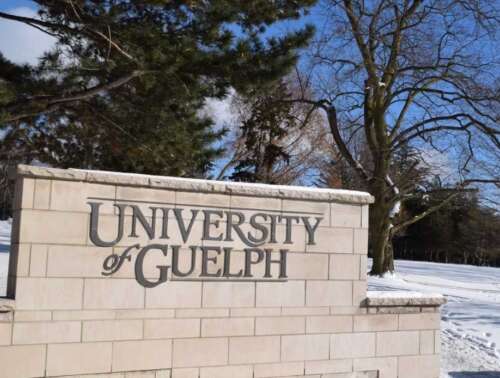 Thirteen University of Guelph faculty members studying everything from COVID-19 in pets to Indigenous environmental governance have been named Research Leadership Chairs (RLC) by the University.
Thirteen University of Guelph faculty members studying everything from COVID-19 in pets to Indigenous environmental governance have been named Research Leadership Chairs (RLC) by the University.
“The RLC program promotes and sustains the groundbreaking research happening at the University of Guelph. These outstanding researchers have remarkable records of excellence in their respective disciplines, and we are proud that they make University of Guelph the home for their research and delighted to recognize all of the work that they have done and continue to do,” said Dr. Malcolm Campbell, vice-president (research).
“RLC recipients embody the University’s diverse research programs, and their creativity, innovation and global impacts deserve to be celebrated.”
U of G launched the RLC program in 2017 to recognize mid- to late-career researchers who have made significant contributions to their field. Nominees have received national and international recognition and are nominated by their respective colleges.
New chair recipients are as follows:
College of Engineering and Physical Sciences
Dr. Eric Poisson, Department of Physics: A leader in studies of gravitational physics and black holes, Poisson co-authored the book Gravity: Newtonian, Post-Newtonian, Relativistic and has led theoretical studies of the generation and propagation of gravitational waves.
Dr. Kathryn Preuss, Department of Chemistry: An inorganic chemist, Preuss studies the synthesis and characterization of materials with spin-based electronic properties with potential applications in quantum computing and artificial intelligence.
College of Biological Science
Dr. Leah Bent, Department of Human Health and Nutritional Sciences: Bent is an international leader in human neurophysiology, particularly in sensory contributions to the regulation of movement and balance.
Dr. Hafiz Maherali, Department of Integrative Biology: An ecologist, Maherali studies the evolution of mutualism between plants and fungi and how these relationships affect species distribution and ecosystem function. He is the director of the U of G Phytotron plant growth facility.
College of Social and Applied Human Sciences
Dr. Myrna Dawson, Department of Sociology and Anthropology: Dawson is director of the Centre for the Study of Social and Legal Responses to Violence and the Canadian Femicide Observatory for Justice and Accountability. Also co-director of the Canadian Domestic Homicide Prevention Initiative with Vulnerable Populations, she has spent more than two decades researching social and legal responses to violence, and especially violence against women and femicide.
Dr. Robin Roth, Department of Geography, Environment and Geomatics: Roth studies Indigenous approaches to environmental conservation. She holds a SSHRC Partnership Grant as principal investigator for the Conservation through Reconciliation Partnership.
Ontario Veterinary College
Dr. Dorothee Bienzle, Department of Pathobiology: A Tier 2 Canada Research Chair in Veterinary Pathology from 2005 to 2015, Bienzle has established research programs on feline immunodeficiency virus and equine asthma. More recently, Dr. Bienzle has also studied COVID-19-causing coronavirus infections in companion animals.
Dr. Jan Sargeant, Department of Population Medicine: Sargeant, a veterinary epidemiologist, has played a critical role in the adaptation of STROBE-Vet and REFLECT – international research and reporting guidelines for veterinary studies.
College of Arts
Dr. Dorothy Odartey-Wellington, School of Languages and Literatures: Odartey-Wellington has received national and international recognition for her role in promoting Afro-Hispanic studies.
Dr. Norman Smith, Department of History: Smith is a pioneer in Chinese history studies, especially the Sino-Japanese history of Northeast China. His award-winning monographs include Resisting Manchukuo: Chinese Women Writers and the Japanese Occupation and Intoxicating Manchuria: Alcohol, Opium and Culture in China’s Northeast.
Ontario Agricultural College
Dr. Tina Widowski, Department of Animal Biosciences: Widowski is an internationally recognized animal welfare scientist who has made significant contributions to the development of farm animal care guidelines including the Canadian codes of practice for swine and poultry producers.
Dr. Claudia Wagner-Riddle, School of Environmental Sciences: Wagner-Riddle’s research into greenhouse gases and the carbon footprint of food production has informed actions by the agricultural sector and governments in addressing climate change.
Gordon S. Lang School of Business and Economics
Dr. Ann Pegoraro, School of Hospitality, Food and Tourism Management: Pegoraro is the Lang Chair in Sport Management and co-director of E-Alliance, the National Research Hub for Gender Equity in Sport. She studies gender equity and diversity in sport. Her major interest in knowledge translation has led to numerous industry partnerships and contracts.
RLC recipients hold their chairs for three years and will receive $15,000 a year in research funding from the University.